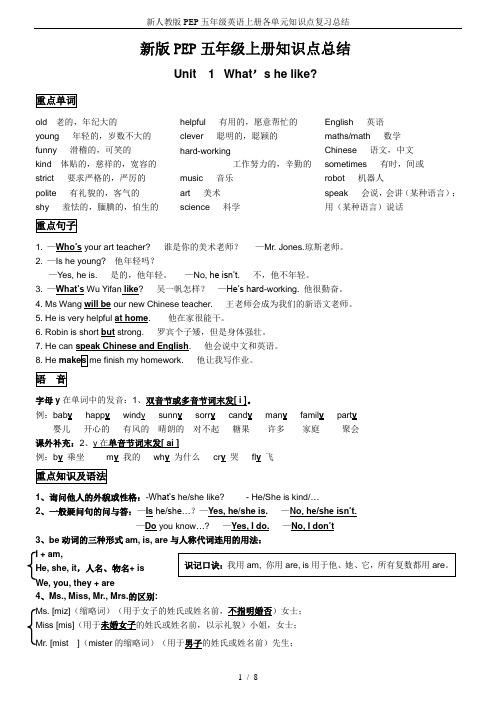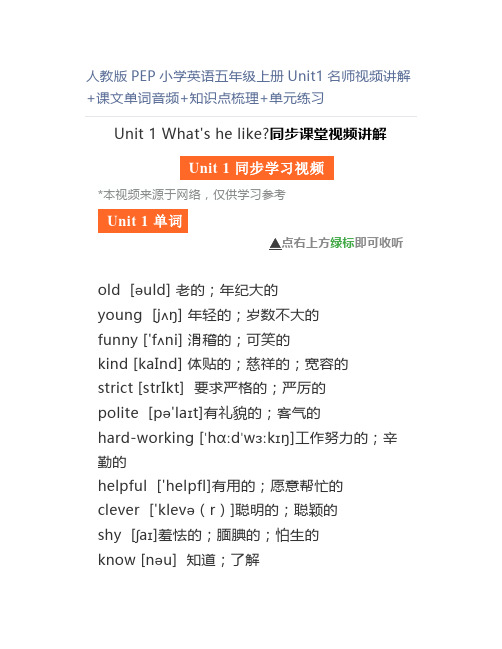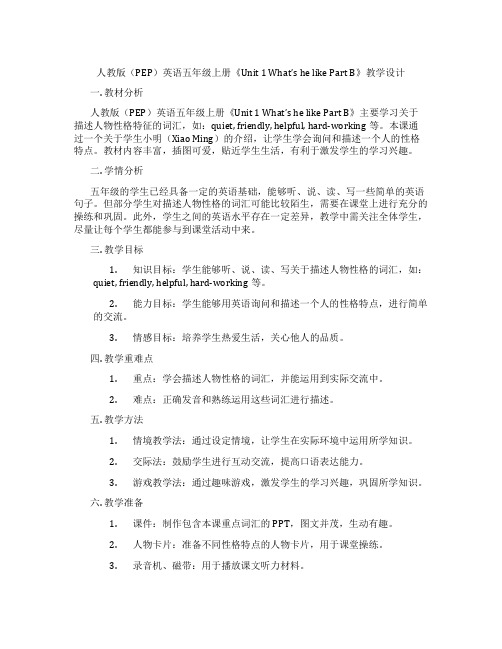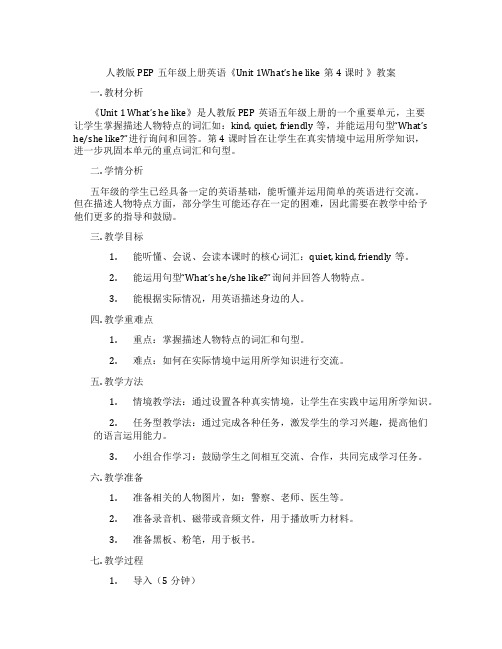五年级英语上册 Unit 1基础知识和重点过关 人教版PEP
新人教版PEP五年级英语上册各单元知识点复习总结

新人教版PEP五年级英语上册各单元知识点复习总结新版PEP五年级上册知识点总结Unit 1 What’s he like?重点单词old 老的,年纪大的young 年轻的,岁数不大的funny 滑稽的,可笑的kind 体贴的,慈祥的,宽容的strict 要求严格的,严厉的polite 有礼貌的,客气的shy 羞怯的,腼腆的,怕生的helpful 有用的,愿意帮忙的clever 聪明的,聪颖的hard-working工作努力的,辛勤的music 音乐art 美术science 科学English 英语maths/math 数学Chinese 语文,中文sometimes 有时,间或robot 机器人speak 会说,会讲(某种语言);用(某种语言)说话重点句子1. —Who’s your art teacher? 谁是你的美术老师?—Mr. Jones.琼斯老师。
2. —Is he young? 他年轻吗?—Yes, he is. 是的,他年轻。
—No, he isn’t.不,他不年轻。
3. —What’s Wu Yifan like? 吴一帆怎样?—He’s hard-working. 他很勤奋。
4. Ms Wang will be our new Chinese teacher. 王老师会成为我们的新语文老师。
5. He is very helpful at home. 他在家很能干。
6. Robin is short but strong. 罗宾个子矮,但是身体强壮。
7. He can speak Chinese and English. 他会说中文和英语。
8. He makes me finish my homework. 他让我写作业。
语音字母y在单词中的发音:1、双音节或多音节词末发[ i ]。
例:bab y happ y windy sunn y sorr y cand y man y famil y part y婴儿开心的有风的晴朗的对不起糖果许多家庭聚会课外补充:2、y在单音节词末发[ ai ]例:b y 乘坐m y 我的wh y 为什么cr y 哭fl y 飞重点知识及语法1、询问他人的外貌或性格:-What’s he/she like? - He/She is kind/…2、一般疑问句的问与答:—Is he/she…?—Yes, he/she is.—No, he/she isn’t.—Do you know…? —Yes, I do.—No, I don’t3、be动词的三种形式am, is, are与人称代词连用的用法:I + am,He, she, it,人名、物名+ isWe, you, they + are4、Ms., Miss, Mr., Mrs.的区别:Ms. [miz](缩略词)(用于女子的姓氏或姓名前,不指明婚否)女士;Miss [mis](用于未婚女子的姓氏或姓名前,以示礼貌)小姐,女士;Mr. [mist](mister的缩略词)(用于男子的姓氏或姓名前)先生;识记口诀:我用am, 你用are, is用于他、她、它,所有复数都用are。
人教版PEP小学英语五年级上册Unit1名师讲解+课文单词+知识点梳理+单元练习

人教版PEP小学英语五年级上册Unit1名师视频讲解+课文单词音频+知识点梳理+单元练习Unit 1 What's he like?同步课堂视频讲解*本视频来源于网络,仅供学习参考▲点右上方绿标即可收听old [əuld] 老的;年纪大的young [jʌŋ] 年轻的;岁数不大的funny ['fʌni] 滑稽的;可笑的kind [kaInd] 体贴的;慈祥的;宽容的strict [strIkt] 要求严格的;严厉的polite [pə'laɪt]有礼貌的;客气的hard-working [ˈhɑːdˈwɜːkɪŋ]工作努力的;辛勤的helpful ['helpfl]有用的;愿意帮忙的clever ['klevə(r)]聪明的;聪颖的shy [ʃaɪ]羞怯的;腼腆的;怕生的know [nəu] 知道;了解our [‘aʊə]我们的Ms [mIz](用于女子的形式或姓名前,不指明婚否)女士will [wɪl](谈及将来)将要sometime ['sʌmtaɪmz]有时;间或robot ['rəʊbɒt]机器人him [hɪm](用作宾语或表语)他speak [spiːk] 会说;会讲(某种语言)说话finish ['fɪnɪʃ]完成;做好Unit 1 知识点梳理五年级英语(上)PEP版Unit 1 What's he like?重点:询问某人的外貌特征或性格特点的句型连词but和and的用法情态动词can的用法难点:询问他人的外貌特征或性格特点人称代词、物主代词、be动词的用法四会单词短语old老的;年纪大的young年轻的;岁数不大的funny滑稻的;可笑的kind体贴的;慈祥的;宽容的strict要求严格的;严厉的polite有礼貌的;客气的hard-working工作努力的;辛勤的helpful有用的;愿意帮忙的clever聪明的;聪颖的shy羞怯的;腼腆的;怕生的三会单词短语know知道;了解our我们的Ms(用于女子的姓氏或姓名前,不指明婚否)女士wiII(谈及将来)将要sometimes有时;间或robot机器人him(用作宾语或表语)他speak会说;会讲(某种语言);用(某种语言)说finish完成;做好headteacher校长music teacher音乐老师惯用表达式Great!太棒了!Really?真的吗?Cool!酷!重点句式或句型1.-Who' s your art teacher?谁是你的美术老师?-Mr Jones.琼斯老师。
人教版(PEP)英语五年级上册《Unit 1 What's he like Part B》教学设计

人教版(PEP)英语五年级上册《Unit 1 What’s he like Part B》教学设计一. 教材分析人教版(PEP)英语五年级上册《Unit 1 What’s he like Part B》主要学习关于描述人物性格特征的词汇,如:quiet, friendly, helpful, hard-working等。
本课通过一个关于学生小明(Xiao Ming)的介绍,让学生学会询问和描述一个人的性格特点。
教材内容丰富,插图可爱,贴近学生生活,有利于激发学生的学习兴趣。
二. 学情分析五年级的学生已经具备一定的英语基础,能够听、说、读、写一些简单的英语句子。
但部分学生对描述人物性格的词汇可能比较陌生,需要在课堂上进行充分的操练和巩固。
此外,学生之间的英语水平存在一定差异,教学中需关注全体学生,尽量让每个学生都能参与到课堂活动中来。
三. 教学目标1.知识目标:学生能够听、说、读、写关于描述人物性格的词汇,如:quiet, friendly, helpful, hard-working等。
2.能力目标:学生能够用英语询问和描述一个人的性格特点,进行简单的交流。
3.情感目标:培养学生热爱生活,关心他人的品质。
四. 教学重难点1.重点:学会描述人物性格的词汇,并能运用到实际交流中。
2.难点:正确发音和熟练运用这些词汇进行描述。
五. 教学方法1.情境教学法:通过设定情境,让学生在实际环境中运用所学知识。
2.交际法:鼓励学生进行互动交流,提高口语表达能力。
3.游戏教学法:通过趣味游戏,激发学生的学习兴趣,巩固所学知识。
六. 教学准备1.课件:制作包含本课重点词汇的PPT,图文并茂,生动有趣。
2.人物卡片:准备不同性格特点的人物卡片,用于课堂操练。
3.录音机、磁带:用于播放课文听力材料。
七. 教学过程1.导入(5分钟)利用课件展示不同性格特点的人物图片,引导学生猜测这些人物的个性特点。
例如:展示一个安静的女生,让学生猜测她是不是很文静(quiet)。
人教版PEP五年级上册英语《Unit 1What’s he like第4课时 》教案

人教版PEP五年级上册英语《Unit 1What’s he like第4课时》教案一. 教材分析《Unit 1 What’s he like》是人教版PEP英语五年级上册的一个重要单元,主要让学生掌握描述人物特点的词汇如:kind, quiet, friendly等,并能运用句型“What’s he/she like?”进行询问和回答。
第4课时旨在让学生在真实情境中运用所学知识,进一步巩固本单元的重点词汇和句型。
二. 学情分析五年级的学生已经具备一定的英语基础,能听懂并运用简单的英语进行交流。
但在描述人物特点方面,部分学生可能还存在一定的困难,因此需要在教学中给予他们更多的指导和鼓励。
三. 教学目标1.能听懂、会说、会读本课时的核心词汇:quiet, kind, friendly等。
2.能运用句型“What’s he/she like?”询问并回答人物特点。
3.能根据实际情况,用英语描述身边的人。
四. 教学重难点1.重点:掌握描述人物特点的词汇和句型。
2.难点:如何在实际情境中运用所学知识进行交流。
五. 教学方法1.情境教学法:通过设置各种真实情境,让学生在实践中运用所学知识。
2.任务型教学法:通过完成各种任务,激发学生的学习兴趣,提高他们的语言运用能力。
3.小组合作学习:鼓励学生之间相互交流、合作,共同完成学习任务。
六. 教学准备1.准备相关的人物图片,如:警察、老师、医生等。
2.准备录音机、磁带或音频文件,用于播放听力材料。
3.准备黑板、粉笔,用于板书。
七. 教学过程1.导入(5分钟)利用图片引导学生进行简单的英语对话,如:“Hello, what’s your name? I’m … How old are you? I’m … years old.”等。
2.呈现(10分钟)展示各种人物图片,如警察、老师、医生等,引导学生用英语描述这些人物。
如:“He’s a policeman. He’s kind.”等。
人教版PEP五年级上册英语《Unit 1What’s he like第2课时》教案

人教版PEP五年级上册英语《Unit 1What’s he like第2课时》教案一. 教材分析《Unit 1 What’s he like》是人教版PEP五年级上册英语的第二课时,本节课主要围绕着描述一个人的外貌特征、性格特点和爱好等进行学习。
通过本节课的学习,学生能够掌握的一般目标有:1. 能够听懂、会说、会读本课的生词和句子;2. 能够用英语简单描述一个人的外貌特征、性格特点和爱好;3. 能够运用所学知识进行简单的日常交流。
二. 学情分析五年级的学生已经具备了一定的英语基础,能够听懂简单的英语指令,能够用英语进行一些简单的交流。
但是对于一些复杂的句子结构和词汇的理解还有一定的困难,因此,在教学过程中,需要教师耐心引导,重复操练,让学生充分理解和掌握所学知识。
三. 教学目标1.知识目标:学生能够听懂、会说、会读本课的生词和句子,能够用英语简单描述一个人的外貌特征、性格特点和爱好。
2.能力目标:学生能够运用所学知识进行简单的日常交流。
3.情感目标:通过本节课的学习,学生能够激发对英语学习的兴趣,增强自信心。
四. 教学重难点1.重点:学生能够听懂、会说、会读本课的生词和句子,能够用英语简单描述一个人的外貌特征、性格特点和爱好。
2.难点:学生能够正确运用一般疑问句进行日常交流。
五. 教学方法1.情境教学法:通过设定各种情境,让学生在实际情境中学习和运用英语。
2.交际法:通过师生互动、生生互动,让学生在交流中学习英语。
3.任务型教学法:通过完成各种任务,让学生在实践中学习英语。
六. 教学准备1.教师准备:准备好本课的教学课件、单词卡片、图片等教学辅助材料。
2.学生准备:学生预习本课的生词和句子,了解本课的主题。
七. 教学过程1.导入(5分钟)教师通过与学生问候,询问学生今天的天气、心情等,引导学生用英语进行回答。
然后,教师展示一张图片,图片中的人物具有不同的外貌特征、性格特点和爱好,引导学生观察并猜测这个人的特点。
PEP人教版五年级上英语Unit1知识点、考点梳理精编

PEP人教版五年级上英语Unit1知识点、考点梳理精编知识点梳理:1. 单词:表示家庭成员的名词,如father(父亲)、mother(母亲)、brother(兄弟)、sister(姐妹)、grandfather(外祖父)、grandmother(外祖母)、uncle(叔叔)、aunt(阿姨)等。
2. 句型:询问家庭成员的句型,如Who's this/that?(这/那个是谁?),It's my father/mother/brother/sister/grandfather/grandmother/uncle/aunt.(这是我爸爸/妈妈/哥哥/姐姐/外公/外婆/叔叔/阿姨。
)3. 短语:表示家庭关系的短语,如爸爸的妈妈(father's mother)、妈妈的爸爸(mother's father)等。
4. 介词:表示所属关系的介词,如of(的),用于连接家庭成员与其所属关系的词语,如father of(...的父亲)、mother of(...的母亲)等。
考点梳理:1. 听力:辨别家庭成员的听力题,根据听到的描述或问句选择正确的家庭成员名称。
2. 口语:回答关于家庭成员的问题,根据问题回答正确的家庭成员名称。
3. 语法:掌握询问家庭成员的句型,以及回答这个句型的正确用法。
4. 理解:理解描述家庭关系的短语,能够根据短语理解家庭成员之间的关系。
5. 书写:正确拼写家庭成员的单词,注意大小写和单复数的变化。
6. 翻译:能够翻译一些关于家庭成员的句子,包括询问和回答家庭成员的句型,以及描述家庭关系的短语。
注:以上内容为人工智能根据题目和知识点推断出的可能答案,仅供参考。
人教版PEP英语五年级(上)Unit1(含视频、翻译、知识点、练习)

人教版PEP英语五年级(上)Unit1(含视频、翻译、知识点、练习)单元练习一、选出不同类的一项。
( ) 1.A. museum B. shop C. postcard( ) 2.A. right B.turn C. left( ) 3.A. behind B.near C. buy( ) 4.A. go B.by C. get( ) 5.A. London Eye B.Tian’anmen C. the Thames二、单项选择。
1. Is it far _______ our school?A. forB. toC. from2. How can I get to the park? You can ______ the No.3 bus.A. goB. takeC. by3. It’s not far. It’s _______A. nearB. longC. far4. _________ , Is there a hospital near here?A.SorryB.Hello C. Excuse me5. _______ is the library?A.What B. Where C .How6. Turn left _______ the bookstore. It’s ______ the left.A. at, atB. on, onC. at, on7. Is there a cinema near here?A. Yes, it is.B. Yes, there isC. No, it isn’t.8. How can I get to the school?A. You can go by bike.B. You are hereC. It’s not far三、连词成句。
1. left, the, post, at, turn, office (.)_______________________________________2. get, can, I, museum, to, the, how, science (?) _________________________________________________3. far, is, it, here, from (?)_________________________________________________ 4. next, the, It’s, museum, to(.)_________________________________________________5. is, a, city, in, my, there, hospital, pet (.) _________________________________________________四、为下列句子选择最佳答语。
人教版(PEP)英语五年级上册《Unit 1 What's he like Part B》教案

人教版(PEP)英语五年级上册《Unit 1 What’s he like Part B》教案一. 教材分析《PEP》英语五年级上册《Unit 1 What’s he like Part B》主要包括以下内容:学习关于描述人物性格特点的词汇,如:kind, funny, strict, quiet等;掌握句型“What’s he/she like? He/She is…”来询问和描述一个人的性格特点;以及相关的听力练习和口语交流活动。
二. 学情分析五年级的学生已经具备了一定的英语基础,能听懂简单的英语指令,并能用英语进行简单的自我介绍和问答。
但是对于如何描述一个人的性格特点,可能还比较困难,因此需要通过各种教学活动,让学生在实际操作中学习和掌握。
三. 教学目标1.能听懂、会说、会读关于描述人物性格特点的词汇。
2.能用句型“What’s he/she like? He/She is…”来询问和描述一个人的性格特点。
3.能通过听力练习和口语交流,进一步了解和描述身边的人。
四. 教学重难点1.重点:掌握关于描述人物性格特点的词汇,以及句型“What’s he/shelike? He/She is…”。
2.难点:如何让学生能够灵活运用所学知识,描述身边的人。
五. 教学方法采用任务型教学法,通过各种任务和活动,让学生在实际操作中学习和掌握描述人物性格特点的词汇和句型。
同时,运用分组合作学习法,让学生在小组活动中,互相交流和描述,提高口语表达能力。
六. 教学准备1.准备关于描述人物性格特点的词汇卡片。
2.准备录音机和听力材料。
3.准备教学PPT。
七. 教学过程1.导入(5分钟)通过播放一首关于描述人物性格特点的歌曲,激发学生的学习兴趣,并引导学生思考:你们知道身边的人都有哪些性格特点吗?2.呈现(10分钟)向学生展示关于描述人物性格特点的词汇卡片,如:kind, funny, strict, quiet等,并引导学生跟读。
- 1、下载文档前请自行甄别文档内容的完整性,平台不提供额外的编辑、内容补充、找答案等附加服务。
- 2、"仅部分预览"的文档,不可在线预览部分如存在完整性等问题,可反馈申请退款(可完整预览的文档不适用该条件!)。
- 3、如文档侵犯您的权益,请联系客服反馈,我们会尽快为您处理(人工客服工作时间:9:00-18:30)。
五年级英语上册Unit 1基础知识和重点过关姓名班级分数
一、听音,连线。
(10分)
short young tall strong old
pretty strict funny thin kind 二、根据词意写出相应的单词。
(10分)
1.高的__________ 2.强壮的__________ 3.矮的__________
4.瘦的__________ 5.积极的__________ 6.老的__________
7.滑稽的__________ 8.亲切的__________ 9.聪明的__________
10.严格的__________
三、破译密码,组成句子,并抄写在横线上。
(10分)
四、将下列词意相反的词连起来。
(10分)
tall big thin young active
small short quiet old strong 五、读一读,连一连。
(5分)
He is Who is What is She is
Who’s She’s What’s He’s 六、看图判断对错。
(10分)
1.The monkey has a long tail.
2.The panda is very thin.
3.Our music teacher is tall and strong.
4.My grandma is very old.
5.The clown is very funny.
七、选词填空(12分)
1.一What is Mr. Zhao like ? 一________ is old.
2.一What’s Miss Sun like? 一________ is young.
3.一What’s Chen Jie like? 一________ is short.
4.一What’s Mike like? 一________ is thin.
5.一What’s Amy like? 一________ is tall.
6.一What is Zhang Peng like? 一________ is strong.
八、找出字谜中的4个单词,用它们组合成一个问句,并抄写在横线上。
(8分)
________________________________________________________________?
九、从B栏里找到A栏的正确答语。
(10分)
A B
1.This is Mr. Hu,our new English teacher.A.How do you do?
2.Who is your math teacher? B.Nice to meet you.
3.Do you have a new English teacher? C.Yes,I do.
4.Is he strict? D.No.he isn’t.He is very kind.5.How do you do? E.Miss Wang is.
十、教师节来啦!老师这里有几个祝福语,请给你喜欢的老师做一张贺卡吧!(15分)
请设计出你的贺卡:
参考答案
一、Look,this is my family photo.This is my father.He’s strong and strict.This is my mother.She’s tall and thin.This is my grandma.She’s old and kind.This little boy is my brother.He’s young and funny.Who’s this short but pretty girl? Haha.It’s me! (答案略)
二、略
三、Do you have new teachers?
四、略
五、略
六、l~5 √ × × √ √
七、l.He 2.She 3.She 4.He 5.She 6.He
八、like,is,what,he;What is he like?
九、l~5 B E C D A
十、略。
